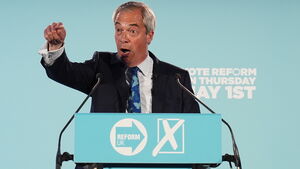Populism will always be the road to nowhere

Reform UK party leader Nigel Farage speaking during a campaign event at last spring's local elections.
We live in strange times. While a permanent feature of life in every century and in every decade is to be convinced that ‘the world is in a terrible state’, there are times - and this surely is one of them - when that cliché makes absolute sense. Gaza’s population is being systematically starved to death in a calculated and premeditated strategy by Israel, with children and their parents enduring unspeakable agony; Ukraine is being bombed and bullied by Putin who is sacrificing thousands of Russian and Ukrainian soldiers in order to satisfy his imperial ambitions; the hapless Trump is presiding over the once stable United States now disintegrating before our eyes; and to top it all a parish priest has stated that ‘if it were up to me, I would only permit Christian immigration into Europe (and) I would only permit Christian immigration into Ireland’.
Sometimes it seems as if the prophetic words of Willam Butler Yeats in his poem, , are once again coming back to haunt us:
With the shooting dead of Charlie Kirk in the gun-happy USA – now with more guns than people – we are seeing in microcosm the THEM and US view of society – now repeated around the world and amplified to cosmic proportions by the toxic addiction of social media where most of humankind (it often seems) form a kind of echo chamber where almost everyone is only conversing with those we agree with.
It’s a template that is easily exploited by populists of the extreme like Nigel Farage and Donald Trump. Farage is responsible in the main for the chaos that Brexit delivered and Trump for the anarchy he is visiting on America and the world – built on the wobbly premise that if you repeat something often enough you get people to believe it’s true.
The problem is that the populist view garners support, especially by those who are easily convinced of its wisdom. But like Trump’s tariffs, populism is constantly being unmasked as a road to nowhere. The difficulty is that there are diametrically opposing voices proposing paths going in different directions.
Thus, when populists and those who oppose them offer their solutions to a particular problem, there seems to be an equivalence between what experience tells us and what the later messiah is proposing, between what science has revealed and what someone, who is by common consent inexpert in the field, is saying.
Thus the fact that the Covid vaccine has saved millions of lives is dismissed on a personal whim often based on little more than a Dúirt bean liom evidence of someone relating a fiction based about what happened to someone else. It’s a bit like arguing with someone that two plus two is not four and who believes that it’s really five because someone he met on his holidays told him it was.
It goes without saying that the responsible position to take is not to go down that road because experience tells us that it merely sows division and conflict. But also that it’s not a credible moral position to adopt and that it’s the responsibility of church leaders in particular to point out the moral and other obligations we all have at this time – and irresponsible to do the opposite.
Recently, we’ve seen examples of both. Last Sunday Pope Leo said: "I would like that today we may together begin to build a culture of reconciliation. We must meet one another, heal our wounds, and forgive the wrongs we did and did not do, but whose effects we still carry. There are no enemies - only brothers and sisters. What we need are gestures and policies of reconciliation."
On the other hand, Fr Brendan Kilcoyne, who is a parish priest in Balla, has called for the introduction of "discriminatory" immigration policies in Ireland, claiming that the country is "crammed" with people who have no sympathy for Irish culture and suggesting that non-Christian migrants should not be allowed to move here. And in a statement that has echoes of populist propaganda, he complained that migrants who "turn up" in Ireland were being "looked after" instead of "being promptly sent back to where they came from and told to apply by a legal method to come into the country".
That comment is full of falsehoods - like Ireland being full (it’s not) or an implication that migrants are here illegally (mostly they’re not), etc – and echoes the fears implanted by a small minority of populists to raise the temperature against a morally defensible policy of accepting our due responsibility for those in need, including those who seek refuge among us.
That comment also betrays an ignorance not just of history but of the essentials of our Christian faith, including people of faiths other than Christianity which Fr Kilcoyne strangely and disrespectfully contends should be a barrier to our acceptance of migrants. It must be the first time in history that someone has suggested that, effectively, acquiring a baptismal certificate is yet another document that necessitates a welcome that, rightly and responsibly, as a nation we have agreed to discharge.
For a country whose people have for centuries taken advantage of the welcome members of our families have received as migrants around the world, it must seem bizarre that fears are being needlessly generated by risible claims as, for instance, that whole sections of British cities had become "no-go areas” for the civil authorities.
"If it were up to me," Fr Kilcoyne is reported as saying, "I would only permit Christian immigration into Europe … I would only permit Christian immigration into Ireland. I think you can justify that on any number of grounds."
The only sensible answer to Fr Kilcoyne’s optimism can be: No, you can’t and you shouldn’t even try.




